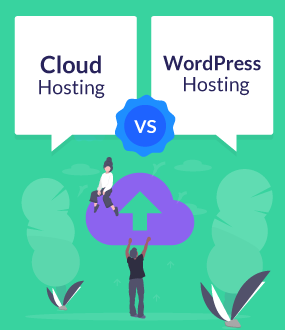Cloud Hosting vs WordPress Hosting
If you click to purchase a product or service based on our independent recommendations and impartial reviews, we may receive a commission. Learn more
Got your head in the clouds? Hard-pressed in search of an answer? Allow us to help.
Web hosting can be a confusing topic. There are so many factors to consider, and so many types of hosting out there – and that’s before you even consider different pricing plans!
Luckily, we’re here to simplify all that for you. If you’re still staring at the drawing board when it comes to hosting, it’s worth looking over our guide on the types of web hosting first.

In this article, we’ll be focusing on the key differences between two specific types of hosting: cloud and WordPress. And to help you make your decision, we’ve done all the legwork for you.
At Website Builder Expert, we’re, well… experts when it comes to hosting. We’ve spent hours researching all the different types of hosting, looked at each one’s strengths and weaknesses, and worked out which providers offer the best service in the business.
But back to cloud hosting vs WordPress hosting, here’s what we’re going to cover:
- What cloud hosting and WordPress hosting are
- The main pros and cons of both
- Their differences in performance, security, management, and scalability
- How much they cost, and the different levels of plans on offer
- The top providers you should consider for cloud hosting or WordPress hosting
That’s enough of a preview – let’s get right to it!
Further Information
- Web Hosting Comparison Chart – Take a side-by-side look at the top five overall providers.
- Best Web Hosting Providers – Get straight into all the top-rated providers according to our detailed research.
1 What Is Cloud Hosting?
Cloud hosting is where your website is ‘virtually’ hosted across several servers.
Unlike shared, VPS, or dedicated hosting, you’re not tied to one physical location, meaning you can pull resources (bandwidth, storage etc.) from lots of different servers. If you’re maxing out bandwidth on one server for example, you’ll be able to tap into another’s resources.
Cloud hosting is great for growing websites and ambitious businesses. Firstly, it works in a similar way to a pay-as-you-go mobile contract, in that you only pay for the resources you use. Secondly, those resources are almost limitless, so if your website experiences a sudden surge in traffic, you don’t need to worry about your site crashing.
Cloud hosting is the newest type of hosting available, but much like an iPhone’s iCloud, it’s scarcely understood. The main takeaway is that cloud hosting is a fantastic option if you need a scalable hosting option, at an affordable price.
Find the right cloud hosting provider for you
2 What Is WordPress Hosting?
WordPress hosting, as you may have guessed, is exclusively for WordPress websites.
It’s very similar to the more typically used types of hosting (shared, VPS, and dedicated), but it focuses on making hosting a WordPress site as easy as possible. Things like one-click installs and automated WordPress updates are commonplace.
WordPress hosting is, unsurprisingly, best for WordPress websites. Before you jump down to our top WordPress hosting providers section, though, it’s important to understand there are two different types: shared WordPress hosting and managed WordPress hosting.
Shared WordPress hosting is your more basic type. It’s cheaper, offers one-click installs, and is generally the best option for personal or static websites.
Managed WordPress hosting is the full package. All your basic needs are fulfilled, plus you get guaranteed automated updates, better security, and faster loading speeds.
Naturally, managed WordPress hosting is more costly, but it can save you an untold amount of time maintaining your site. This makes it the perfect option for businesses and sites that are looking to scale.
Find the right WordPress hosting provider for you
3 Pros and Cons
Cloud Hosting Pros and Cons
| Cloud Hosting Pros | Cloud Hosting Cons |
|---|---|
|
|
WordPress Hosting Pros and Cons
| WordPress Hosting Pros | WordPress Hosting Cons |
|---|---|
|
|
4 Performance
Performance really boils down to how smoothly your website runs for its visitors. If you want to give them the best possible experience, then fast loading speeds and strong uptimes are a must.
Cloud hosting allows you to adjust your resources based on the amount of traffic your site is getting. If you have a sudden traffic surge – for example, off the back of being featured in the news – you can get more bandwidth so your site continues to run smoothly.
WordPress hosting is more standard. You have set resource limits that can’t be exceeded. These limits will vary from plan to plan, but so long as you’re confident you have enough, performance shouldn’t be an issue.
Cloud Hosting vs WordPress Hosting: Performance – Verdict
Cloud hosting has the edge when it comes to performance. While WordPress hosting allows you to choose resource limits that give your site breathing space, with cloud hosting, you never have to worry. You pay for the resources you use – need more one month? Not a problem.
5 Security
Security should always be one of your top priorities when hosting your website. This is especially true if you’re a business, and hold personal information about customers.
Cloud hosting is similar to shared hosting: secure, but not impenetrable. Your site may be spread across multiple servers, but you still share these with other websites – this means that if another site on one of your servers is compromised, you’re potentially at risk too.
WordPress hosting is split. While shared WordPress hosting is similar to cloud hosting, managed WordPress hosting is like challenging a hacker to invade a castle that sits atop a hill, on foot, on their own.
You get WordPress-specific security – like malware scans and firewalls – and your site is automatically backed up. So, on the off chance anything does go wrong, you have everything ready to restore.
Cloud Hosting vs WordPress Hosting: Security – Verdict
Because of the extra security offered by managed plans, it’s a win for WordPress hosting. Tailor-made security comes on top of automated backups and regular updates. If you process lots of sensitive customer information, managed WordPress hosting is your best option.
6 Management
As the old saying goes, ‘time is money’. No one wants to be sitting around trying to update hosting software or fix a security breach. Unless you’re a real computer whiz, that stuff’s better left to the experts!
Cloud hosting is a fully managed service. Your provider will sort out everything for you – from setup to bug fixes. This is excellent for anyone short of time, or technical knowhow.
WordPress hosting offers both unmanaged and managed WordPress hosting. Shared WordPress hosting is cheaper for obvious reasons, but most will opt for the fully managed service.
Cloud Hosting vs WordPress Hosting: Management – Verdict
This one’s got to be a tie. You can get a managed solution with cloud hosting or WordPress hosting, so it’s hard to pick a winner in this category. Our only advice is that opting for managed hosting is a smart choice for anyone who values their time.
7 Scalability
Scalability is just a fancy word for having room to grow. We’re all ambitious, and given that changing hosting plans can be a bit of a faff, it’s only right you look for a type of hosting that can grow with your website.
Cloud hosting, by its very nature, is hugely scalable. Your site’s resources come from several different servers, so you can max out one and pick up resources from another. You also only pay for what you use, meaning you’re not signing up to an expensive plan for things you won’t need until further down the line.
WordPress hosting is scalable in the sense that once you’ve outgrown shared WordPress hosting, you can upgrade to a managed WordPress hosting plan. Beyond that, though, you’ll have set resource limits you can’t exceed.
Cloud Hosting vs WordPress Hosting: Scalability – Verdict
Cloud hosting wins on scalability. You can pull resources from several different servers and only ever pay for what you need, making cloud hosting ideal for growing websites. WordPress hosting can be upgraded from shared to managed, but there’s still limits with both.
8 Pricing
Pricing can be a little tricky. Because cloud hosting works on a pay-as-you-go basis, it’s impossible to tell you exactly how much it costs. You’re ultimately in charge of the final monthly fee.
That said, there are some base rates which are offered by providers to give you an indication of the basic costs involved. Below, we’ve picked out some of the top providers (who we’ll talk about in the next section) to show you their monthly fees:
| Provider | Cloud | Shared WordPress | Managed WordPress |
|---|---|---|---|
| Bluehost | n/a* | $3.95 – $5.95 | $29.99 – $59.95 |
| A2 Hosting | $5 – $371 | $7.99 – $24.46 | $24.46 – $75.48 |
| HostGator | $12.95 – $19.95 | $14.95 – $27.95 | n/a* |
| 1&1 IONOS | $10 – $350 | n/a* | $9 – $15 |
*n/a is stated where the provider doesn’t offer that type of hosting.
Starting with WordPress hosting, as you can see, the pricing is fairly similar from provider to provider. If cheap rates are important to you, Bluehost offers the cheapest shared WordPress hosting, while 1&1 IONOS can’t be matched for managed WordPress hosting deals.
Cloud hosting varies in price depending on how much resource you use. As starting monthly rates go, however, A2 Hosting is hard to beat. Cloud hosting also varies massively in price because you can personalize it to your liking. Generally speaking, it’ll cost around $5 – $15/month. Only enterprise-level businesses will need a $100/month plus plan.
It’s also important to mention that the prices shown in our table don’t take into account promotions. Nearly every hosting provider will offer discounted rates for an initial period, but because the length of this time changes, we’ve stuck with the standard pricing.
Cloud Hosting vs WordPress Hosting: Pricing – Verdict
It’s close – very close – but we’re giving pricing to cloud hosting. The main benefit of WordPress hosting is you know where you stand month-on-month in terms of costs. But it’s the adaptability of cloud hosting that gives it the upper hand.
9 Cloud Hosting vs WordPress Hosting: Top Providers
Remember at the start of this article where we spoke about the research we’ve done? Well, now you get to see the results!
Having reviewed more hosting providers than you can shake a stick at, we’re in a pretty good position to say which are the best. You can even check out our top-rated 11 providers here for their overall hosting service.
Here, we’ll be discussing the top three cloud hosting providers, and the top three WordPress hosting providers. Each one has slightly different features, performance, and pricing, so we’ll provide a little detail to help you.
Top 3 Cloud Hosting Providers
1&1 IONOS
Leading the pack for cloud hosting is 1&1 IONOS. Alongside a 99.98% uptime and cheap starting rates of $10/month, you’ll also enjoy up to 128GB of RAM, 16 CPU cores, unmetered bandwidth, and 500GB of storage. There’s even 24/7 help and support, and a 30-day money back guarantee if you change your mind.
A2 Hosting
A2 Hosting is a slightly cheaper alternative to 1&1 IONOS. If you don’t need the same level of performance or resource, A2 is a smart pick. From just $5/month, you can get 99.95% uptime and up to 32GB of RAM, 12 CPU cores, 9TB of bandwidth, and 250GB of storage. You will need to pay extra for an SSL security certificate, however.
SiteGround
In all honesty, SiteGround really isn’t on the same level as 1&1 IONOS or A2 when it comes to cloud hosting. For starters, the plans are far more expensive (starting at $80/month), and the resource limits just don’t stack up. You do get a solid 99.98% uptime and free backups, but in truth, it’s a big step down from 1&1 IONOS and A2 Hosting.
Top 3 WordPress Hosting Providers
Bluehost
Bluehost is the king of WordPress hosting. It offers both shared and managed WordPress hosting at affordable rates, and has an across-the-board uptime of 99.98%. You’ll also be provided with one-click install, automated WordPress software updates, and 24/7 support. As if that wasn’t enough, there’s also unmetered storage and bandwidth, a free domain, free backups, and a 30-day money back guarantee.
A2 Hosting
A2 Hosting again offers both shared and managed WordPress plans. Its managed WordPress hosting is particularly impressive, with free backups and automated updates to both WordPress software and plugins. You’ll also get unmetered bandwidth and storage, but the uptime is not quite as impressive as Bluehost, coming in at 99.95%.
HostGator
HostGator is slightly different in that it only offers shared WordPress hosting. That said, it does have the best uptime of any provider, at 99.99%. On top of that, you get free backups and automated WordPress updates for both software and plugins. And with 24/7 support and unmetered bandwidth/storage, you could do a lot worse.
Further Information
10 Cloud Hosting vs WordPress Hosting: Conclusion
By now, you should have a pretty clear idea of the following:
- What cloud hosting and WordPress hosting are
- Which type of hosting suits you
- How much cloud hosting and WordPress hosting cost
- The top three providers for cloud hosting and WordPress hosting
To recap, and help you make that final decision, let’s summarize cloud hosting vs WordPress hosting one last time.
When You Should Choose Cloud Hosting Over WordPress Hosting
If you need flexible hosting that’s capable of adapting as your website grows, then cloud hosting is for you. Remember – WordPress hosting is just for WordPress websites. If you’ve used any other self-hosted platform to build your website, the choice is made for you.
When You Should Choose WordPress Hosting Over Cloud Hosting
If you have a WordPress website, and don’t want the hassle of a complicated setup or ongoing maintenance, then WordPress hosting is for you.
Thanks to one-click installs and automated updates, you have that helping hand making sure your site is always kept in check. Managed WordPress hosting should be your pick of the two if you process large amounts of sensitive data.
If you’ve decided cloud hosting is the way to go, we’d recommend using either 1&1 IONOS or A2 Hosting. On the other hand, WordPress users won’t find a better provider than Bluehost.
11 Cloud Hosting vs WordPress Hosting: FAQs
Do you have to use WordPress hosting to host a WordPress website?
WordPress hosting is obviously recommended – one-click installs and automated updates are massive time-savers – but there’s nothing stopping you from using another type of hosting. If you’re happy to keep an eye on updates yourself, you can use anything from VPS hosting to cloud hosting.
How do you know when you’re ready to upgrade from shared WordPress hosting to managed WordPress hosting?
The general way to tell is to look at your resource limits. If you’re on an upper-tiered shared WordPress hosting plan and you’re hitting your limits each month, upgrading makes sense. Equally, if you hold any personal information, you should use managed WordPress hosting for the increased security.
Is cloud hosting better than shared hosting?
It may not be cheaper than shared hosting, but it’s certainly more scalable. The problem with shared hosting is it’s easily outgrown. You then have the hassle of trying to change plans or providers. Cloud hosting will grow with you, and is a far better option in the long-run.
Can you get hosting for free?
Not if you’re using a self-hosted platform. However, if you use a hosted platform, like a website builder, hosting is included as part of your monthly fee. To learn more about website builders, why not head over to our comparison chart, or check out the top-rated platforms here.
Website Builder Expert aims to provide you with honest data. That’s why we conduct our own research and obtain direct, personal insight.










2 comments